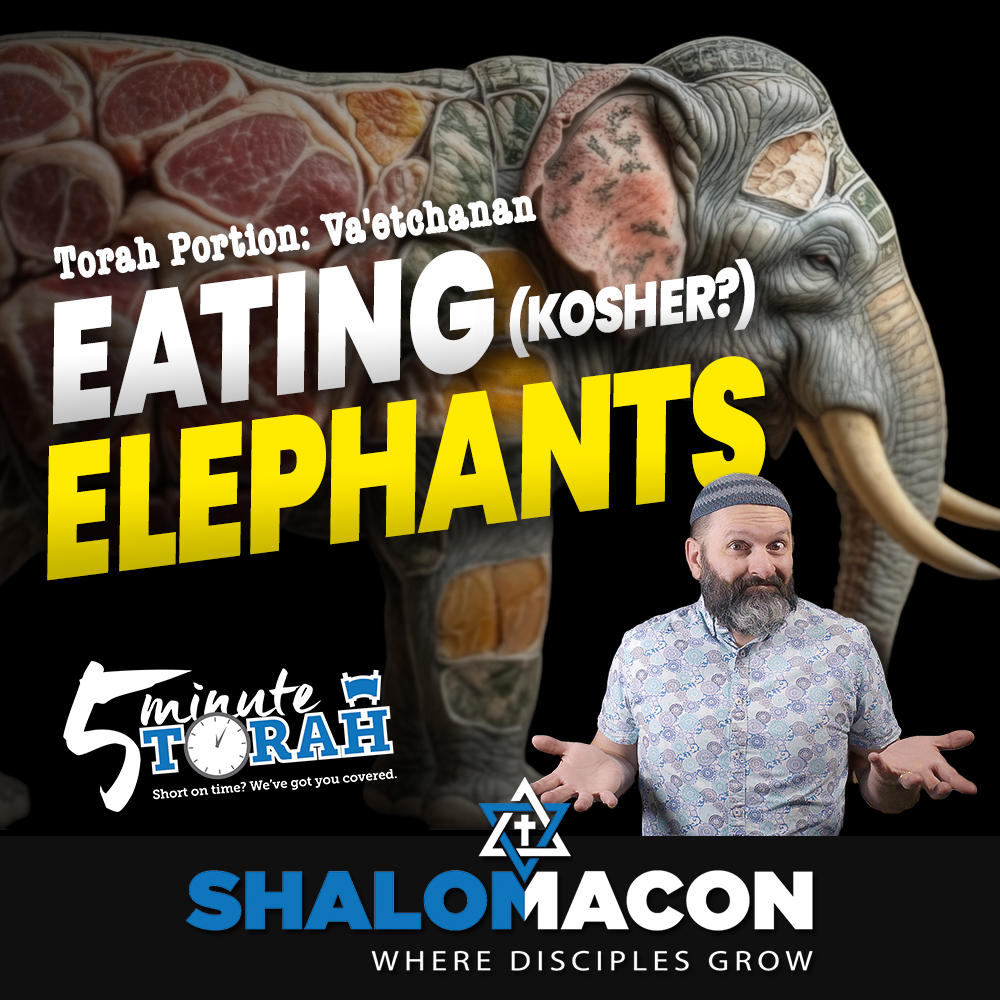[00:00:00] Speaker A: I can't do it. It's impossible. There's absolutely no way. Why should I even try? Have you ever been given a seemingly impossible task, whether it's through your job or through your family, and it just seems so overwhelmingly unimaginable that you seriously just want to throw your hands up in the air and walk away? What about when it comes to the things God asks of you? If you're struggling with any of this, then stick around for this week's five minute tour.
Welcome back to another five minute Torah. This week we are continuing with the Book of Deuteronomy with the second portion of V Etchanan, Deuteronomy, 323 711. And here are the three things that you need to know about it. Number one, undying hope, the faithfulness of Moses. The portion Vayetchanan begins with Moses fervent plea to God to allow him to enter the promised land. Moses recounts his plea, which occurred after God had informed him that he would not be allowed to enter the land due to an earlier incident at the waters of Medebah. Moses had a deep desire to enter the land and an unwavering dedication to the Israelites, despite knowing he would personally never experience the fulfillment of gods promise. Number two heavy hitters, ten commandments and the Shema the Torah portion of Vedhanan includes a restatement of the ten Commandments given to the Israelites in Mount Sinai. Moses reminds the people of these fundamental laws, which are the foundation of their covenant with God. Additionally, the portion includes the core text of the Shema deuteronomy, chapter six, verses four through nine, a central prayer affirming the oneness and sovereignty of God affirmed by Yeshua in mark twelve. The Shema is a central declaration of faith in Judaism and holds significant importance in jewish liturgy and daily life. Number three, remember and observe. Passing down the Torah throughout the portion, Moses reminds the Israelites of their unique relationship with God and their responsibility to remain faithful to the covenant made with them at Mount Sinai. He emphasizes the importance of Israel's obeying God's commandments and the consequences of straying from them. He also cautions them against idolatry, reminding them of the consequences of turning away from God and worshiping other deities. They're also called to remember God's miracles, his teaching, and his commandments, and are urged to observe and teach these principles to future generations. If you're looking for a place to learn, connect, and grow, then Shalom Macon is the place. It doesn't matter where you are in the world, you can find a connection with Shalom Macon through our live services every Saturday and through our private social network we call Shalom at home. Check us out on YouTube and on our
[email protected], for more information. We look forward to connecting with you and seeing you this Shabbat. This week's tour commentary is called eating elephants, kosher ones, that is, and comes from my book, five minute Torah, volume one. Have you ever been overwhelmed at what seemed like an impossible task? We can respond to this in one of two ways. The first is to give up without even trying, because we instantly know that we will not be able to accomplish the task. The alternative, however, is to get our minds off of the impossibility of the task and onto the responsibility at hand. If we focus on the immediate requirements of the task and work our hardest on what we can do, then we might accomplish more than we realize. Moses was faced with a similar problem in this week's Torah portion in deuteronomy four we read, then Moses set apart three cities in the east beyond the Jordan. But the problem with this verse is that it is not what it actually says in the original Hebrew. If we were to read the actual hebrew text, we would understand it to say, then Moses will set apart three cities. This helps us understand why most translations change this to read in the past tense. It doesn't seem to make sense on the surface that Moses will, at some future point separate these cities of refuge. How is Moses going to do this at some future time, if he has been barred from entering into the Holy Land? Moses had a problem without a solution in sight. He had been given an impossible task. Many people look at the task of living out a Torah centered life in a similar way. Weve wrongly been taught for far too long that living out the commandments of Torah is impossible. Therefore, most people shrug it off without much thought. No one can live it out perfectly, many have said. But are we required to live the precepts of the Torah flawlessly, or are we commanded to give it our best effort every day? A parable one day a man was walking along the beach early in the morning and noticed hundreds of thousands of precious stones and pearls that had washed up on the beach during the night. They covered the beach as far as the eye could see. Does he get depressed or give up when he realizes he will never be able to collect every last item that is washed up on the shore? Or does he become elated because he can collect as many as possible with any means he has? This should be our response to the overwhelming number of commandments in the Torah. We should rejoice in the few that we can observe and long for the ones we are currently missing out on. They are precious gems given to us by our creator and our redeemer. Yes, the task may be impossible to complete, but it's not impossible to embark on. As Rabbi Tarfon would say, it is not incumbent upon you to finish the task, but neither are you free to absolve yourself from it.
Even though Moses knew he could not enter the promised land and therefore could not personally work to establish these three cities of refuge, he nonetheless took up the task and began working toward their realization. Do we have the ability to bring back Yeshua and initiate the messianic erade? Maybe not, but we can definitely work toward their realization through faithfully living out the precepts given to us within the Torah and the rest of the scriptures. Will we be able to live them up perfectly? No, we will just have to work on them a little bit every day until Yeshua's return. As they say, how do you eat an elephant? The kosher one, of course. One bite at a time. What has overwhelmed you lately and made you feel like it's impossible? I'd love to hear from you in the comments below. And I just want to remind you we have an amazing new series that we've begun. It's called repaving the Romans road and it's all about the book of Romans and understanding Paul from a messianic jewish perspective. It's guaranteed to change the way you read Paul, particularly the Book of Romans. You can check it out using the link above or at the end of this video. I'll see you next week for another messianic insight into the eternal Torah of God. Blessings from Shalom Macon, the place where disciples of Yeshua learn, connect, and grow.
[00:07:02] Speaker B: Please visit our website, shalommakin.org, to learn more about us. Join our live Services Access other teachings sign up for our newsletter, join our private network that will connect you with our greater community from around the world, or contribute to the work of Shalom Macon. Thank you for watching, and we look forward to connecting with.



